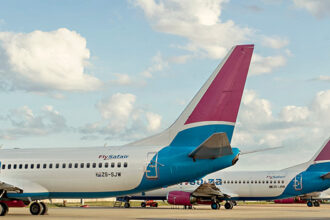FlySafair, South Africa’s leading low-cost airline, is grappling with two major challenges: scrutiny over its shareholding structure and the potential for a disruptive strike. These issues have raised concerns about the airline’s operational stability and its future in a competitive market.
Ownership Compliance Issues
The International Air Services Council (IASC) recently flagged FlySafair’s ownership structure, raising questions about its adherence to South African laws that cap foreign ownership of domestic airlines at 25%. FlySafair, however, is majority-owned by ASL Aviation Holdings, an Ireland-based entity, which holds approximately 74.86% of the airline through a subsidiary. This configuration has sparked scrutiny, particularly since FlySafair did not seek to amend its air service license following a restructuring in 2019.
Airlink and Global Aviation, FlySafair’s competitors, initially filed complaints in February, prompting the IASC to begin a formal inquiry. The council has yet to announce its final decision on potential sanctions, which could range from fines to a suspension of FlySafair’s license, pressuring the airline to restructure its ownership to maintain compliance.
In response to the inquiries, FlySafair assured the public that it is committed to meeting all regulatory standards. The airline expressed a willingness to work closely with authorities to resolve these issues and affirmed that its focus remains on delivering safe, affordable air travel to South African passengers.
A Possible Strike Over Rostering Disputes
Adding to its regulatory troubles, FlySafair faces the possibility of a strike by its workforce. Trade union Solidarity, representing FlySafair’s crew members, reported a 93% member support rate for industrial action in protest of a new rostering system the airline intends to implement in February. Solidarity stated that despite ongoing consultations, FlySafair has continued with the rostering changes, which have created widespread dissatisfaction among employees.
Solidarity emphasised its openness to further negotiations but reaffirmed its commitment to advocate for its members’ interests should a resolution remain elusive. FlySafair has refrained from publicly addressing the dispute but indicated it would issue a formal statement if necessary.
A Test of Stability and Trust
As the airline addresses these hurdles, FlySafair has maintained a “business as usual” stance, assuring customers and stakeholders that operations remain unaffected for now. With a reputation for affordability and reliability, FlySafair is navigating a critical moment that tests its commitment to regulatory compliance, workforce satisfaction, and operational integrity.
Whether these challenges will affect FlySafair’s position in South Africa’s aviation market remains to be seen. However, the airline’s transparent communication and willingness to cooperate may bolster confidence among customers and stakeholders as it seeks a path forward.









